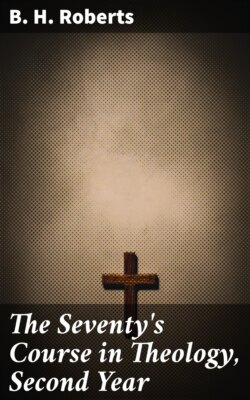Читать книгу The Seventy's Course in Theology, Second Year - B. H. Roberts - Страница 6
На сайте Литреса книга снята с продажи.
TEXT BOOKS AND AUTHORITIES.
ОглавлениеTable of Contents
Relative to the text books. All of the books recommended in the Introduction of last year's course are available and necessary as authorities in this present year's course, and in addition to these works of reference, a good, General History will be of great service. That of P. V. N. Meyers, prepared for Colleges and High Schools, (Ginn & Company, Publishers, Boston) being perhaps the most desirable, price $1.50.
In the Apostatic division of our treatise, Part V, numerous references are made to Ecclesiastical histories and works of a theological character, some of which would be difficult to obtain, such as "Mosheim's Institutes of Ecclesiastical History;" Neander's "History of the Christian Religion;" Schaff's "History of the Apostolic Church;" Mosheim's "History of Christianity in the First Three Centuries;" Hefele's "History of Christian Councils;" "Millman's History of Christianity in the First Three Centuries;" Lardner's "Works," and the like. But "The Students Ecclesiastical History," written by Dr. Philip Smith, author of the "Old Testament" and "New Testament Histories," frequently quoted in Seventy's Year Book No. I, and in this, published by Harper Brothers in two volumes, (price $3.00), is within the reach of all; and on the whole is a very fine Compendium of Ecclesiastical History, quite dispassionate in tone, and generally trustworthy, and brings events down to the death of Luther, 1540.
Also there is in print the "Ecclesiastical History" by Eusebius Pamphilus. Bishop of Caesarea, covering the first three Christian centuries. Eusebius is generally styled the "Father of Ecclesiastical History," and those who can obtain this authority are dealing with original sources of information. The work is translated from the Greek, and published and obtainable through any of our book stores. In this connection we urge our members to gradually obtain; but as soon as may be, these reference books, as no workman can get along without tools.
The Improvement Era: We call attention also to the Improvement Era, the Organ of the Seventies and of the Young Men's Mutual Improvement Associations, with its special Seventy's department, The Seventy's Council Table. This magazine affords the First Council opportunity to reach every quorum of Seventy once every month throughout the year—Twelve communications each year, of several pages of printed matter, bearing upon Seventies work;—suggestions in class work; dealing with questions of quorum administration; with questions of doctrine, and history, and exposition of the scriptures. How valuable an adjunct it has become in our work! We enjoin it upon our presidents that they see to it that all subjects in the Era of special interest to their several quorums be brought forth to said quorums by the Presidents, and read for the information of the quorum, that all may be benefited by the instruction. From reports made to the General Secretary, Elder J. G. Kimball, we learn that some two thousand Seventies take the Era, so that with each monthly issue of the Era we are in touch with that many individual Seventies. Many more of our members, however, should subscribe for this magazine, and the Presidents should urge members to subscribe for and read it as one of the best means of keeping in touch with the work of the Seventies.
